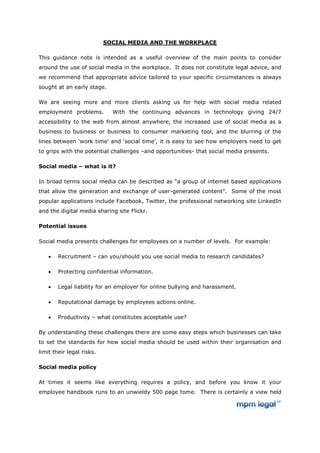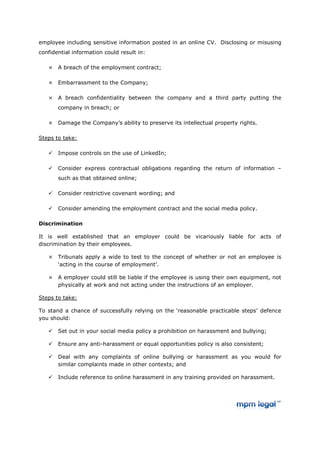Social Media And The Workplace February 2012
- 1. SOCIAL MEDIA AND THE WORKPLACE This guidance note is intended as a useful overview of the main points to consider around the use of social media in the workplace. It does not constitute legal advice, and we recommend that appropriate advice tailored to your specific circumstances is always sought at an early stage. We are seeing more and more clients asking us for help with social media related employment problems. With the continuing advances in technology giving 24/7 accessibility to the web from almost anywhere, the increased use of social media as a business to business or business to consumer marketing tool, and the blurring of the lines between ŌĆśwork timeŌĆÖ and ŌĆśsocial timeŌĆÖ, it is easy to see how employers need to get to grips with the potential challenges ŌĆōand opportunities- that social media presents. Social media ŌĆō what is it? In broad terms social media can be described as ŌĆ£a group of internet based applications that allow the generation and exchange of user-generated contentŌĆØ. Some of the most popular applications include Facebook, Twitter, the professional networking site LinkedIn and the digital media sharing site Flickr. Potential issues Social media presents challenges for employees on a number of levels. For example: ŌĆó Recruitment ŌĆō can you/should you use social media to research candidates? ŌĆó Protecting confidential information. ŌĆó Legal liability for an employer for online bullying and harassment. ŌĆó Reputational damage by employees actions online. ŌĆó Productivity ŌĆō what constitutes acceptable use? By understanding these challenges there are some easy steps which businesses can take to set the standards for how social media should be used within their organisation and limit their legal risks. Social media policy At times it seems like everything requires a policy, and before you know it your employee handbook runs to an unwieldy 500 page tome. There is certainly a view held
- 2. by some in the HR community that having a social media policy displays a lack of trust and is an unrealistic way of trying to control staff. We disagree, and recommend that a policy on social media is appropriate, not least because you can shape your organisationŌĆÖs expectations for employee use of social media ŌĆō whether that is a complete ban on workplace use or promoting it as a networking or business development tool. Bear in mind though that restrictions which are disproportionate can: ŌĆó Undermine employee morale; ŌĆó Lead to employee non-compliance; and ŌĆó Ultimately not achieve any real protection for the company. Recruitment There is nothing to prohibit an employer from using social media to find out information about a candidate. However, before deciding whether or not it is appropriate for your organisation to do so, consider the following: ├Ś Discrimination ŌĆō more likely information will be obtained which could lead to inferences of discrimination if the candidate is rejected; ├Ś Data Protection Act is engaged if information obtained online is recorded or used; ├Ś Candidate should be given the opportunity to comment on the informationŌĆÖs accuracy; and ├Ś Candidate should be told about the employerŌĆÖs vetting and verification exercises. Steps to take: ’ā╝ Ensure any enquiries are proportionate; ’ā╝ Inform candidates about your vetting and verification exercises; ’ā╝ Use online checks after short listing or first interviews to limit the risk of a claim that decisions were discriminatory; and ’ā╝ Seek clarification from the candidate of any information obtained online. Confidential and proprietary information The obvious risk here is that confidential information is posted online ŌĆō ranging from an employee acting wilfully and intent on damaging their employerŌĆÖs business to an
- 3. employee including sensitive information posted in an online CV. Disclosing or misusing confidential information could result in: ├Ś A breach of the employment contract; ├Ś Embarrassment to the Company; ├Ś A breach confidentiality between the company and a third party putting the company in breach; or ├Ś Damage the CompanyŌĆÖs ability to preserve its intellectual property rights. Steps to take: ’ā╝ Impose controls on the use of LinkedIn; ’ā╝ Consider express contractual obligations regarding the return of information ŌĆō such as that obtained online; ’ā╝ Consider restrictive covenant wording; and ’ā╝ Consider amending the employment contract and the social media policy. Discrimination It is well established that an employer could be vicariously liable for acts of discrimination by their employees. ├Ś Tribunals apply a wide to test to the concept of whether or not an employee is ŌĆśacting in the course of employmentŌĆÖ. ├Ś A employer could still be liable if the employee is using their own equipment, not physically at work and not acting under the instructions of an employer. Steps to take: To stand a chance of successfully relying on the ŌĆśreasonable practicable stepsŌĆÖ defence you should: ’ā╝ Set out in your social media policy a prohibition on harassment and bullying; ’ā╝ Ensure any anti-harassment or equal opportunities policy is also consistent; ’ā╝ Deal with any complaints of online bullying or harassment as you would for similar complaints made in other contexts; and ’ā╝ Include reference to online harassment in any training provided on harassment.
- 4. Reputation The immediacy and visibility of social media applications means the scope for reputational damage is high. Consider the Virgin employees who referred on Facebook to passengers being ŌĆśchavsŌĆÖ and the WaterstoneŌĆÖs employee who referred to his employer as ŌĆśBastardstoneŌĆÖsŌĆÖ in his blog. ’ā╝ Consider a ban on negative comments about the company, its employees or customers; ’ā╝ Use the social media policy to set clear standards of acceptable behaviour; ’ā╝ Consider amending your contracts of employment to prohibit defamation; and ’ā╝ Engage with your employees about how best to maintain a positive corporate image. Productivity Since the use of the internet has become increasingly prevalent, most employers will already have an acceptable use policy covering both internet access and email use. You should consider whether or not it is appropriate to update those policies to refer to the use of social media ŌĆō you may take the view that access to and use of social media can already be adequately dealt with through existing policies. ’ā╝ Ensure your policies set out what constitutes acceptable use; ’ā╝ Train employees on the policy (social media as a general training topic is a useful one to cover); and ’ā╝ Monitor compliance. Summary The following recommendations are made in the recent ACAS research paper ŌĆ£Workplaces and Social NetworkingŌĆØ: 1. All employers should have a policy on internet/social media use. 2. The policy should set out clear and explicit expectations and the consequences of violations. 3. Keep it simple ŌĆō the message that online conduct should not differ from offline conduct may suffice. 4. Consult with staff on the policy, communicate the policy and review it. 5. Ensure that adequate mechanisms to raise grievances exist. 6. Consider the benefits that social networking can offer. If you have any questions or comments arising from this note, please feel free to contact Peter Beisty (contact details below) for a no obligation discussion.
- 5. mpm legal is a specialist employment law practice. Our firm was created based on an awareness of the changing marketplace in the provision of legal services and a desire to break free from the traditional full service law firm. We are committed to delivering a level of service commensurate with much larger law firms at a lower cost. We like to build lasting partnerships with our clients and deliver advice which is pragmatic, clear and cost effective. The breadth of our collective experience encompasses advising FTSE 100 companies, US owned global companies and owner-managed businesses. Our typical day to day work includes advising HR teams and in-house counsel on: ŌĆó Employment tribunal litigation ŌĆō covering all types of cases from standard unfair dismissal cases to complex multi-claim cases. ŌĆó Workforce management ŌĆō complex grievances, disciplinary and dismissal procedures, collective redundancy consultations, business restructures, TUPE transfers, managing sickness absence, dealing with protected disclosures and promoting equality of opportunity. ŌĆó Business protection ŌĆō monitoring staff during employment, securing information and trade secrets, taking pre-emptive steps following the resignation of an employee and restricting the activities of departing employees. ŌĆó Contracts and policies - contracts of employment, service agreements, cross- border secondment agreements, bonus and commission schemes, salary sacrifice agreements and compromise agreements. If you think we could add value to your organisation then please contact us: Mark Minns Adrienne Brown Peter Beisty 0118 951 4572 0118 951 4571 0118 951 4573 mark@mpmlegal.co.uk adrienne@mpmlegal.co.uk peter@mpmlegal.co.uk




